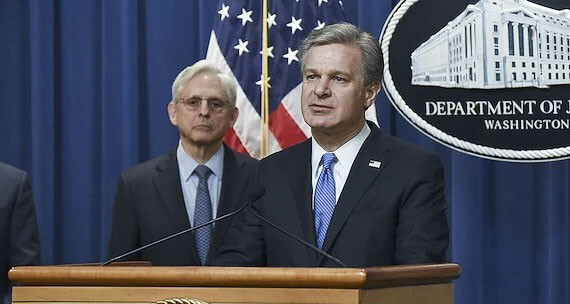
Bureau had no evidence of Russian ‘disinformation’
Art Moore
WND News Center
The FBI worked with the intelligence community to pressure Twitter and other social media and news media to censor the New York Post’s revelations of Joe Biden’s knowledge of his family’s influence-peddling operation while lacking any evidence of a purported Russian “disinformation” operation.
Factual information about the foreign business dealings was discredited by the FBI and the IC both after and before the Post’s blockbuster Oct. 14, 2020, story, according to the seventh Twitter Files release, reported by journalist Michael Shellenberger on Monday.
Significantly, in July 2020, the FBI’s Elvis Chan – assistant special agent in charge at the office in San Francisco, where Twitter is headquartered – arranged for temporary Top Secret security clearances for Twitter executives to enable the FBI to share information about “threats” to the upcoming elections.
Shellenberger recalled that Twitter Files No. 6, released Friday, showed the FBI had a system in place in which it had “constant and pervasive” contact with Twitter executives, acting as if it were a “subsidiary” of the social-media giant.
The seventh release recounts the FBI’s involvement with the laptop, beginning in December 2019, when Delaware computer store owner John Paul Mac Isaac contacted the bureau after discovering evidence of criminal activity on Hunter Biden’s abandoned machine. The FBI took the computer and launched an investigation. But by August, Mac Issac had not heard back from the FBI, and he emailed Rudy Giuliani, President Trump’s personal lawyer at the time, who was under FBI surveillance. In early October, Giuliani gave the contents of the hard drive to the Post.
During all of 2020, the FBI and other law enforcement agencies repeatedly primed Twitter to dismiss reports of the laptop as a Russian “hack and leak” operation, as Yoel Roth, head of trust and safety for Twitter at the time, stated in a sworn declaration in December 2020.
The FBI did the same to Facebook, according to CEO Mark Zuckerberg.
Yet, as Chan has admitted, the FBI warnings of a Russian hack-and-leak operation were not based on any new intelligence.
In fact, Twitter insisted publicly that there was no evidence to support claims by journalists of foreign influence on its platform.
It was after repeated pushback by Twitter regarding claims of foreign interference that Chan arranged for temporary Top Secret security clearances for Twitter executives so the bureau could share information about threats to the upcoming elections.
On Aug. 11, 2020, as Shellenberger reported, Chan “shared information with Roth related to the Russian hacking organization, APT28, through the FBI’s secure, one-way communications channel, Teleporter.”
When the Post published the laptop revelations Oct. 14, 2020, Roth said in an internal communication that the story “isn’t clearly violative of our Hacked Materials Policy, nor is it clearly in violation of anything else,” but he said “this feels a lot like a somewhat subtle leak operation.”
Jim Baker – the former FBI attorney who was then Twitter’s senior general counsel – replied to Roth, insisting the Hunter Biden materials were either faked, hacked or both, and violated Twitter policy.
However, Shellenberger observed it’s inconceivable that Baker believed the messages on the laptop were either fake or hacked. The FBI had had possession of the laptop for 11 months, as documented by a subpoena.
It likely would have taken a few hours for the bureau to confirm that the laptop had belonged to Hunter Biden, wrote Shellenberger, arguing it took only a few days for journalist Peter Schweizer to do it.
Also read:
- Tesla, Netflix, Philip Morris among those pushing WA governor for tax vetoesGov. Ferguson is facing mounting pressure from business groups to veto several tax bills before Tuesday’s legislative deadline.
- Letter: ‘Anyone from the majority party listening?’In a letter to the editor, area resident Bob Zak argues that HB 1163 is unconstitutional and criticizes the legislative majority for supporting it.
- Our Community Salutes those who have enlisted in the militaryThe Our Community Salutes event at Skyview High School honored more than 60 local enlistees preparing to serve in the U.S. military.
- POLL: Should the I-5 Bridge project be paused over cost and bidding concerns?Clark County Today’s weekly poll asks whether the I-5 Bridge replacement should be paused as questions grow around rising costs and a lack of competitive bids.
- Opinion: TriMet contract: MAX vehicles cost $4.5 millionRep. John Ley examines TriMet’s MAX vehicle purchases, arguing most were replacements and not connected to the bridge project.
- Clark County Sheriff’s Office releases May 7 critical incident videoClark County Sheriff’s Office has released body-worn camera video from a deadly May 7 incident, now under state investigation.
- Journey Theater presents The Adventures of Tom SawyerJourney Theater is bringing Tom Sawyer to life in Battle Ground with performances running May 30 through June 7.











